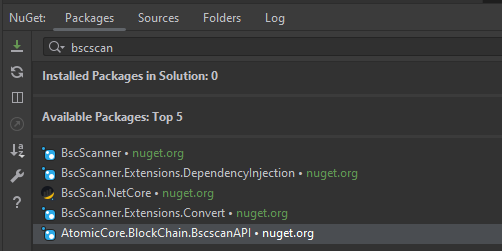3 minutes
BscScanner
BscScanner is a C# library that encapsulates all Web-API endpoints exposed by BscScan, the explorer that shows transactions on the Binance Smart Chain blockchain. It has been downloaded by 2,100+ people on NuGet.
The package is split up into 3 packages:
- BscScanner - The core library containing all methods pertaining to the BscScan API
- BscScanner.Extensions.Convert - A conversion libary to convert BNB to GWEI and back
- BscScanner.Extensions.DependencyInjection - A dependency injection library that allows users to inject the core library’s classes into services.
The choice to split functionality into 3 packages is commonly used in .NET development. Some people may want to use the core package without dependency injection, in something such as a console application, while some may opt into using the Dependency Injection package in an ASP.NET Core application.
Why?
Why did I make these packages? At the start of 2020 I started investing in projects on the Binance Smart Chain, and soon after got the idea to make my own website that keeps track of a wallet address. I knew I needed to interact with the BscScan explorer, and so started writing classes to do this.
Quickly, I found that their API was not designed in the best way (incorrect use of status codes, json data was formatted in a strange way), and so knew my code was going to be messy.
I looked through the NuGet package library, and found that there were no .NET libraries that interacted with the BscScan explorer.

So, I decided to task myself with creating it myself, bearing in mind, I had never made one before.
What
The library needed to solve the problem of getting data from the blockchain:
- API Mapping - Map a URL endpoint to a callable, awaitable method in C#.
- Asynchronous methods - Web requests take time, and so awaiting the task prevents blocking of the main thread.
- Dependency Injection - I wanted to use this in an ASP.NET Core project, which relies heavily on DI to function.
How
The whole library revolves around a class and interface. The user of the library only has to reference the interface in their code:
public interface IBscScanClient {
Task<float> GetBnbBalanceSingleAsync(string address);
Task<IEnumerable<BscBalance>> GetBnbBalanceMultipleAsync(IEnumerable<string> addresses);
Task<IEnumerable<BscTransaction>> GetTransactionsByAddress(string address, int startBlock = 1, int endBlock = 99999999);
Task<IEnumerable<BscTransaction>> GetTransactionsByHash(string hash);
Task<IEnumerable<BscTransaction>> GetTransactionsByBlockRange(int startBlock = 1, int endBlock = 99999999);
Task<IEnumerable<BscTransaction>> GetBep20TokenTransferByContractAddress(string contract);
Task<IEnumerable<BscTransaction>> GetBep20TokenTransfersByAddress(string address = null, string contractAddress = null);
Task<IEnumerable<BscTransaction>> GetErc721TokenTransfersByAddress(string address = null, string contractAddress = null);
Task<IEnumerable<BscTransaction>> GetErc721TokenTransferByContractAddress(string contract);
Task<IEnumerable<BscBlock>> GetBlocksValidatedByAddress(string address);
Task<string> GetAbiFromSourceAddress(string address);
Task<IEnumerable<BscContract>> GetSourceCodeFromSourceAddress(string address);
Task<BscTxStatus> GetTransactionReceiptStatus(string txHash);
Task<BscBlockReward> GetBlockRewardByBlock(int block);
Task<BscBlockCountdown> GetBlockCountdownByBlock(int block);
Task<int> GetBlockNumberByTimestamp(DateTime time);
Task<int> GetBlockNumberByTimestamp(long unixTime);
Task<int> GetLatestBlock();
Task<double> GetTokenTotalSupply(string address);
Task<double> GetTokenCirculatingSupply(string address);
Task<double> GetAccountBalanceByContractAddress(string contractAddress, string accountAddress);
Task<double> GetBnbTotalSupply();
Task<IEnumerable<BscValidator>> GetBscValidators();
Task<BscBnbPrice> GetBnbLastPrice();
}
Each method invokes its subsequent web request and returns the formatted result:
public async Task<float> GetBnbBalanceSingleAsync(string address) {
var url = $"https://api.bscscan.com/api?module=account&action=balance&address={address}&tag=latest&apikey={_apiKey}";
var obj = await Get<BscBalanceSingleSchema>(_client, url);
return float.Parse(obj.Result);
}
You may notice that I have to use float.Parse(obj.Result) to obtain the float value from the BscBalanceSingleSchema, which is due to the fact that BscScan returns everything as string, even though JSON supports int and floats. Annoying!